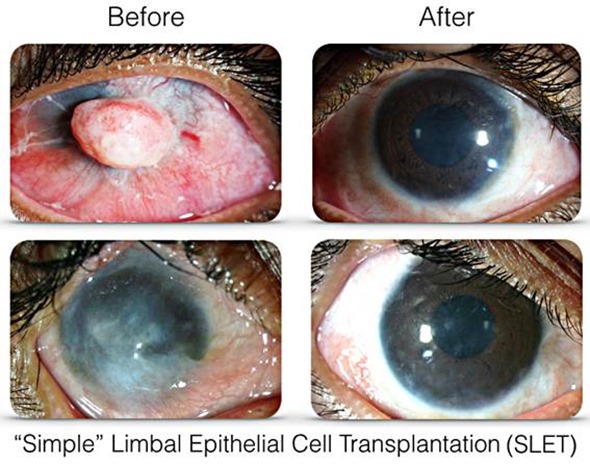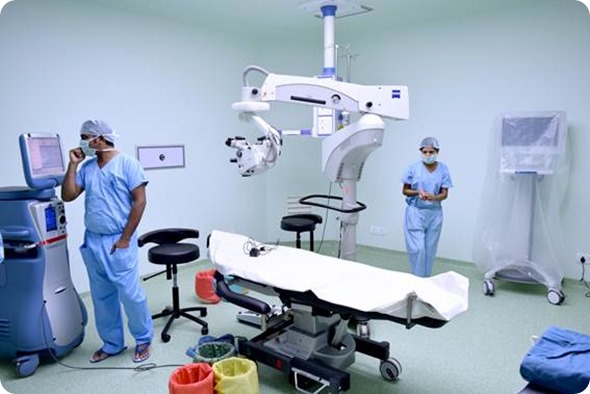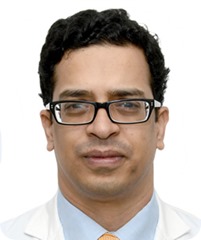Corneal blindness is estimated to be the second most prevalent cause of blindness in many less developed countries. Globally, bilateral corneal blindness is estimated to afflict 4.9 million persons and accounts for 12% of 39 million blind, utilizing WHO 2010 global blindness data.
© LVPEI
The global breakdown illustrates the particularly heavy burden of corneal blindness in emerging and developing countries, with 98% of bilateral corneal blindness existing outside of developed countries.
To understand the true magnitude of corneal blindness, the Disability Adjusted Life Years (DALY) probably outstrips that caused by cataract, since corneal blindness occurs in a relatively younger population.
To add to the burden of corneal blindness, unilateral corneal blindness is estimated to afflict 23 million people worldwide, about the size of the entire population of Australia.
How is corneal blindness prevented?
Trachoma, corneal opacities, and onchocerciasis along with corneal infections, Vitamin A deficiency and trauma account for the major causes of corneal blindness.
In addition to preventive strategies for these chief contributors, corneal transplantation remains as the primary intervention to treat corneal blindness.
Preventive strategies include environmental modifications, antibiotic prophylaxis and dietary supplements. However education and training of corneal surgeons will be a force multiplier in the preventive and therapeutic strategy by improving the recognition and early treatment of these conditions

This image is taken from a patient who is undergoing a SLET (Simple Limbal Epithelial Transplantation). Doctors at LVPEI and the TCKI have since not only performed SLET for hundreds of patients with blinding and unsightly ocular burns, restoring their sight and cosmesis, but have also trained cornea surgeons from across the country and the globe in this procedure. This now means that patients need not have to travel all the way to Hyderabad, but could get optimal care locally. It has significantly decreased the cost and made limbal stem cell transplantation more accessible through SLET.
© LVPEI
Can you please outline the Tej Kohli Cornea Institute (TKCI) and LV Prasad Eye Institute (LCPEI)’s vision to control corneal blindness globally by 2030?
Tej Kohli Cornea Institute’s strategy to prevent blindness is planned in three phases. Initially it would include capacity building and strengthening resources within the LV Prasad Eye Institute network, which currently covers four states in India at different levels. This would include working in the areas of service delivery, education, research, product development, technology, advocacy and influencing policy.
In the second phase, we would like to identify the strategies that work the best in this network and deploy these nationally with partners across the country.
The final phase would include identifying strategic partners in developing countries globally and expanding these initiatives.

The new Operating Room complex comprising 14 completely modular operating rooms with state of the art equipment. Three of these operating rooms are dedicated to Corneal surgery and three more for anterior segment surgery.
© LVPEI
How important is education in controlling corneal blindness?
Education in controlling corneal blindness involves both educating the service providers as well as the patients at different levels.
Public education to focus on preventive and early intervention in seeking appropriate eye care is key for early detection and management of corneal conditions.
Similarly educating eye care providers including cornea specialists, optometrists, technicians, nursing staff and staff for eye banking is paramount to improve accessibility to eye care. This is especially crucial in underserved areas where availability of expertise to manage corneal disease is sorely lacking.
Adequate training not only allows cornea care to reach the remotest of rural areas but also will help establish a network of cornea care provides that can serve as a an excellent referral model.
What are the main challenges that need to be overcome?
Challenges are present at multiple levels but the top three challenges appear to be
- Accessibility to quality cornea care
- Availability of donor corneal tissue
- Inadequate trained cornea specialists
Do you think the 2030 timescale is achievable?
The timescale of 2030 is absolutely achievable from the point of view of avoidable blindness but perhaps not all corneal blindness. With regards to corneal disease, our focus at the Tej Kohli Cornea Institute is predominantly on controlling corneal blindness.

Dendritic cells in the cornea imaged by confocal microscopy.
© LVPEI
How does corneal blindness affect people’s lives?
Blindness in itself is incapacitating not only for the individual but also for the family of the individual, for who he or she turns from and asset to a liability. Corneal blindness is especially cruel in this regard since it tends to affect younger individuals with many years still to live.
What impact would controlling corneal blindness have on economic growth in developing countries?
The burden of corneal blindness on the community is not just reflected by the prevalence, but also by the younger age of those with corneal blindness, with very high disability adjusted life years (DALYs).
The average age for blindness caused by corneal opacities has been reported to be much lower than other more prevalent causes such as cataract. Thus corneal blindness impacts many in their most productive years of life, severely impacting economic productivity both at the level of the individual and the community at large.
What do you think the future holds for corneal blindness?
While the numbers of existing corneal blind worldwide is daunting there is large reason for optimism, based on overall improvement in medical care and infrastructure, successful eye bank development efforts and evolving techniques in corneal transplantation.
While public health initiatives and preventative care provides the long-term solution to addressing corneal blindness, the world's ophthalmic community is poised to dramatically scale up access to corneal transplantation to meet the needs of the millions who are currently blind.
Similar to the growth of cataract surgeries, countries such as India, are well positioned to develop widespread, innovative, and sustainable models for providing transplantation.
Where can readers find more information?
- Turning the tide of corneal blindness. Oliva MS, Schottman T, Gulati M. Indian J Ophthalmol. 2012 Sep-Oct;60(5):423-7. doi: 10.4103/0301-4738.100540. Review.
- Geneva: WHO Press; 2009. World Health Assembly Document A62/7: Action plan for the prevention of avoidable blindness and visual impairment. 2009 – 2013; pp. 7–17.
- Resnikoff S, Pascolini D, Etya’ale D, Kocur I, Pararajasegaram R, Pokharel GP, et al. Global data on visual impairment in the year 2002. Bull World Health Organ. 2002;82:844–51.
- Dandona R, Dandona L. Corneal blindness in a southern Indian population: Need for health promotion strategies. Br J Ophthalmol. 2003;87:133–41.
- Garg P, Krishna PV, Stratis AK, Gopinathan U. The value of corneal transplantation in reducing blindness. Eye (Lond) 2005;19:1106–14.
- Faal H. Preventing corneal blindness, working with communities. Community Eye Health. 2009;22:36–7.
About Pravin Vaddavalli
Director, Tej Kohli Cornea Institute
Head, Refractive surgery and cataract
LV Prasad Eye Institute, Hyderabad, India
Pravin Krishna Vaddavalli completed his medical school from Bangalore Medical College, Bangalore and specialized in Ophthalmology from Guntur Medical College, Guntur. He then completed a long-term fellowship program at LV Prasad Eye Institute in Cornea and Anterior Segment and went on to join the faculty at the LV Prasad Eye Institute in early 2004.
During the early years, he worked mainly in the areas of contact lenses and infection and published seminal work on identifying infections with the confocal microscope. Later he spent time understanding and treating corneal diseases in children till he found his calling in lamellar corneal surgery, corneal transplantation, keratoconus and refractive surgery.
Pravin went on to complete a second fellowship at the Bascom Palmer Eye Institute, Miami in 2011 in Cornea and refractive surgery and currently heads the Cataract and refractive surgery service.
He has over 70 peer reviewed and indexed publications, over 300 presentations and has contributed to leading textbooks. Pravin was awarded the outstanding young investigator award at the SERI AVRO meeting in 2006 and has since won the best paper of session award at ASCRS, 3 times in a row and the national best paper award twice in Cornea and Refractive surgery.
Dr Vaddavalli is a founding member of the executive council of the Cornea Society of India and serves as Chair of the Scientific Committee of the Telangana Ophthalmology Society.
Pravin loves to travel and read but is most passionate about making a difference to the lives of patients we see everyday and while teaching the next generation in the clinic.
About the Tej Kohli Cornea Institute
The Tej Kohli Foundation, founded by Tej Kohli, global tech entrepreneur and philanthropist, is funding the Tej Kohli Cornea Institute (TKCI) where advances in ophthalmology and treatment are being undertaken to control corneal blindness. The Tej Kohli Foundation currently operates in Costa Rica, India and Africa, whilst constantly exploring new countries where they can have the most impact on society at large. The Foundation is supported through the success of Kohli Ventures and the skills and intellectual capital provided by its senior management team.